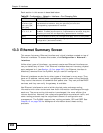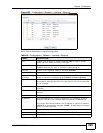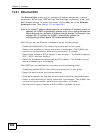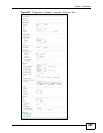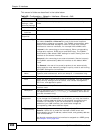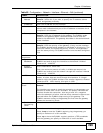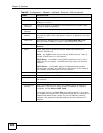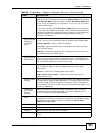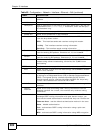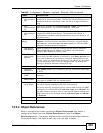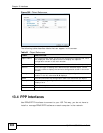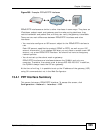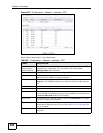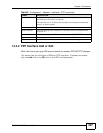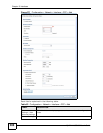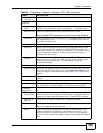
Chapter 13 Interfaces
ZyWALL USG 300 User’s Guide
302
IP Address Enter the IP address to assign to a device with this entry’s MAC
address.
MAC Address Enter the MAC address to which to assign this entry’s IP address.
Description Enter a description to help identify this static DHCP entry. You can use
alphanumeric and ()+/:=?!*#@$_%- characters, and it can be up to
60 characters long.
RIP Setting See Section 16.2 on page 390 for more information about RIP.
Enable RIP Select this to enable RIP in this interface.
Direction This field is effective when RIP is enabled. Select the RIP direction
from the drop-down list box.
BiDir - This interface sends and receives routing information.
In-Only - This interface receives routing information.
Out-Only - This interface sends routing information.
Send Version This field is effective when RIP is enabled. Select the RIP version(s)
used for sending RIP packets. Choices are 1, 2, and 1 and 2.
Receive
Version
This field is effective when RIP is enabled. Select the RIP version(s)
used for receiving RIP packets. Choices are 1, 2, and 1 and 2.
V2-Broadcast This field is effective when RIP is enabled. Select this to send RIP-2
packets using subnet broadcasting; otherwise, the ZyWALL uses
multicasting.
OSPF Setting See Section 16.3 on page 391 for more information about OSPF.
Area Select the area in which this interface belongs. Select None to disable
OSPF in this interface.
Priority Enter the priority (between 0 and 255) of this interface when the area
is looking for a Designated Router (DR) or Backup Designated Router
(BDR). The highest-priority interface identifies the DR, and the
second-highest-priority interface identifies the BDR. Set the priority
to zero if the interface can not be the DR or BDR.
Link Cost Enter the cost (between 1 and 65,535) to route packets through this
interface.
Passive
Interface
Select this to stop forwarding OSPF routing information from the
selected interface. As a result, this interface only receives routing
information.
Authentication Select an authentication method, or disable authentication. To
exchange OSPF routing information with peer border routers, you
must use the same authentication method that they use. Choices are:
Same-as-Area - use the default authentication method in the area
None - disable authentication
Text - authenticate OSPF routing information using a plain-text
password
MD5 - authenticate OSPF routing information using MD5 encryption
Table 60 Configuration > Network > Interface > Ethernet > Edit (continued)
LABEL DESCRIPTION



